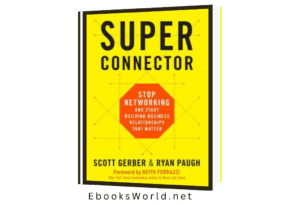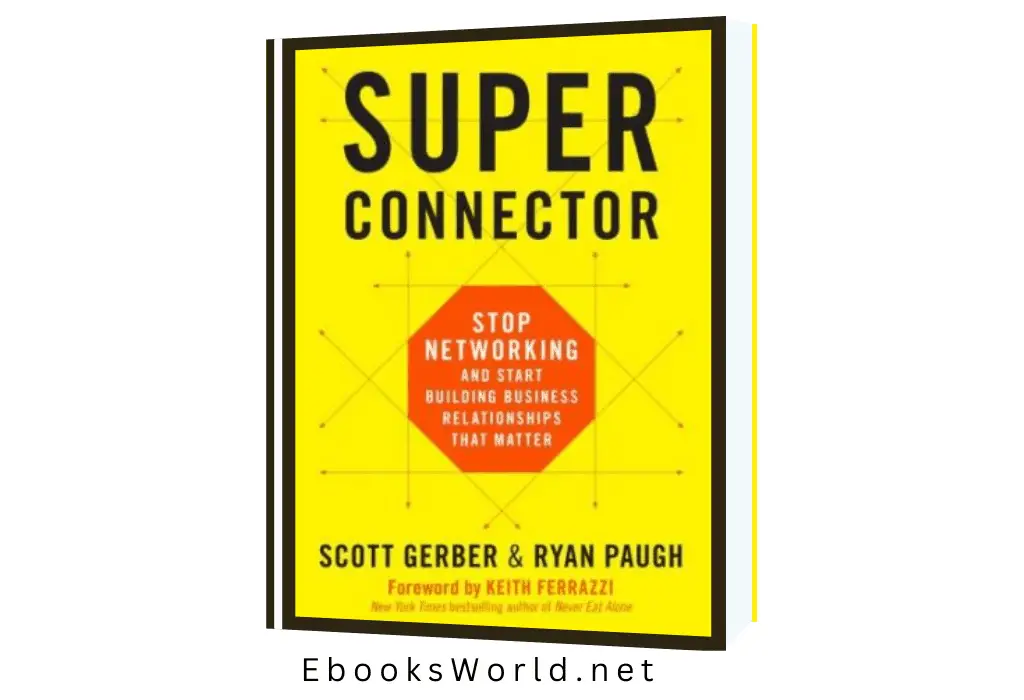Superconnector : stop networking and start building business relationships that matter

Ratings
“Superconnector: Stop Networking and Start Building Business Relationships That Matter” is a book by Scott Gerber and Ryan Paugh that provides insights and strategies on how to move beyond traditional networking and cultivate meaningful business relationships. The book is centered around the concept of superconnecting, which involves building genuine connections with others to create a network that goes beyond superficial interactions. Here is a summary of key points from the book:
1. Redefining Networking: The authors challenge the conventional approach to networking, which often involves collecting business cards and making shallow connections. They propose a shift towards superconnecting, emphasizing the importance of quality over quantity in building relationships.
2. Building a Personal Brand: Superconnectors focus on cultivating a strong personal brand. This involves understanding one’s unique strengths and leveraging them to create a memorable and authentic presence. Building a personal brand is key to attracting the right connections and opportunities.
3. Authenticity and Transparency: Unlike traditional networking which can feel transactional, superconnecting emphasizes authenticity and transparency. Building genuine relationships requires being open about goals, challenges, and aspirations. This authenticity fosters trust and strengthens connections.
4. Adding Value to Others: Superconnectors prioritize adding value to the people in their network. This can take various forms, such as making introductions, sharing resources, or offering assistance. By actively contributing to others’ success, superconnectors create a reciprocal environment that benefits everyone involved.
5. Proactive Listening: Effective communication is a cornerstone of superconnecting. The book highlights the importance of proactive listening – truly understanding others’ needs, challenges, and goals. By actively listening, superconnectors can better tailor their support and build deeper connections.
6. Utilizing Technology Wisely: While technology can facilitate connections, the book suggests using it judiciously. Superconnectors recognize the value of face-to-face interactions and personal connections. Technology should enhance, not replace, human relationships.
7. Building a Diverse Network: A robust network includes individuals from diverse backgrounds, industries, and experiences. Superconnectors intentionally seek out diversity, recognizing that a broad network brings different perspectives and opportunities.
8. Creating Communities: The authors emphasize the importance of creating and participating in communities. These can be physical or virtual spaces where like-minded individuals gather to share knowledge, support each other, and foster collaboration.
9. Strategic Relationship Building: Superconnecting involves strategic relationship building. This means identifying key individuals who align with your goals and investing time and effort into nurturing those relationships. It’s not about casting a wide net but about cultivating meaningful connections.
10. Continuous Learning and Adaptation: In a rapidly changing business landscape, superconnectors recognize the importance of continuous learning and adaptation. Staying informed about industry trends and emerging opportunities allows them to provide relevant and valuable insights to their network.
Conclusion:
“Superconnector” advocates a paradigm shift from traditional networking to superconnecting, emphasizing the cultivation of meaningful, authentic, and reciprocal relationships. By adopting these principles, individuals can build a powerful network that goes beyond superficial connections, leading to long-term success and fulfillment in both personal and professional spheres.







